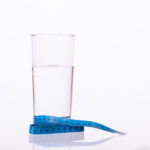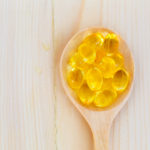By David Blyweiss, M.D., Advanced Natural Wellness
Everyone knows that water is essential to life-and that our bodies are made up of 70% water. But there’s a lot about water that’s, well, pure myth.
The truth is, much of what we think we know about H2O is nothing more than guesswork.
But when it comes to hydration and good health, it takes more than guesswork. It takes some myth-busting facts.
Myth No. 1: Dehydration only happens when the body is deprived of water for days.
Truth: Most people regularly suffer from chronic low-level dehydration.1 And that can cause digestive problems because water is critical to make the digestive juices that aid the digestive process. If we don’t get that water, we don’t secrete enough digestive fluids. The result? Gas, bloating, nausea, poor digestion and a loss of appetite.
Open your arteries, improve blood flow for a new health miracle...
Did you know your circulatory system has over 60,000 miles of arteries, veins and other blood vessels, if stretched end to end?
But as you age, your blood vessels undergo changes, which may cause them to stiffen, thicken and get clogged.
GOOD NEWS! Doctors have now identified a “Miracle Molecule” inside your arteries that helps OPEN your arteries and IMPROVE blood flow.
It’s what Dr. Valentin Fuster calls it, "One of the most important discoveries in the history of cardiovascular medicine."To you, that means...
- Healthy blood pressure
- Sharper mind and memory
- Skyrocketing energy and muscular strength
- Increased pleasure and passion in the bedroom
- Improved circulation to every cell and organ in your body
Go here to discover a new natural way to significantly boost the levels of this miracle molecule in YOUR body NOW!
Myth No. 2: Your body needs eight, 8-ounce glasses of water daily.
Truth: Even though your body needs a steady supply of water to operate efficiently, there’s no hard and fast scientific proof that 8 x 8 is the magic formula. The Institute of Medicine (IOM) actually set the adequate total-daily-water intake at higher than 64 ounces – 3.7 liters (125 fluid ounces) for men and 2.7 liters (91 fluid ounces) for women.2 But those numbers refer to total water intake. It includes all beverages and water-containing foods like watermelon and cucumbers. And if you’re especially active, even that amount may be too low.
Myth No. 3: When it comes to hydrating, all beverages are created equal.
Truth: Not so. In a perfect world, the 90 to 125 ounces recommended by the Institute of Medicine would include your morning coffee, the soda you drank with lunch and even that glass of wine at dinner. But caffeinated, sweetened and alcoholic drinks pack chemical cargoes (or trigger chemical reactions) that demand significant amounts of fluid to properly process and filter. As a result, these beverages can actually set you back by dehydrating your body.
The World's Quickest Solution for Ending Prostate and Urinary Misery
This has recently been revealed to be one of the only real breakthroughs in prostate health.
The seeds of a strange fruit (sometimes called "Chinese Apples") hold powerful phytonutrients that are a revolution in prostate health.
In fact, UCLA and Veterans Administration research have now proved this to be true.
Not only that, but it may be the worlds quickest solution for ending prostate misery.
Simply stated, these phytonutrients represent a huge step beyond beta sitosterol, saw palmetto, and other phytosterols alone.
Simply click HERE if you want to have fast prostate relief...restful, uninterrupted sleep...no more constant "urges to go"...enhanced virility...and optimal prostate support for life.
Myth No. 4: By the time you get thirsty, you’re already dehydrated.
Truth: Yes and no. If you’re mildly dehydrated, you may not feel thirsty but your body might be sending other signals telling you that you need more hydration – from headaches and stomachaches to low energy or dry skin.3 Like an underwatered plant, your body can survive on less water than it wants, but it certainly won’t thrive. Drinking water only when you’re thirsty may relegate you to being less than optimally hydrated, and it may undermine your energy and vitality. On the other hand, constantly sipping or gulping calorie- or chemical-laden beverages is also a bad idea. Get in the habit of drinking a glass of water first thing in the morning, and a few more glasses of water throughout the day. Also drink proactively. This is especially important during strenuous exercise, long airplane flights and in hot weather.
Myth No. 5: Staying hydrated is all about water.
Truth: Nope. You can drink lots of water and still be dehydrated on a cellular level. That’s because it takes a delicate balance of minerals, electrolytes and essential fatty acids to properly hydrate your bloodstream, your tissues and your cells. Minerals, especially electrolytes and trace minerals, help transport water into the cells, where they also activate enzymes. Enzymes are the basis of every biological process in the body, from digestion to hormone secretion to cognition. And without essential fatty acids – which form the basis for cellular membranes – cells can’t properly absorb, hold and stabilize the water and other nutrients they’re supposed to contain. Adding a multimineral supplement to a diet filled with fruits, vegetables and cold water fish can fill in the gaps you might have if you only drink purified or distilled water.
Myth No. 6: Healthy urine is always clear.
Truth: The color of your urine is directly linked to your hydration status. That yellow tint is a measure of how many solid particles (sodium, chloride, nitrogen and potassium) are excreted. The color’s intensity depends on how much water the kidneys mix with these solids. Less water=darker urine. More water=lighter urine. Dark or rank-smelling urine are signs your body may need more water. But light-to-medium yellow urine is fine. You should also know that some vitamins like riboflavin (B2), can turn urine bright yellow, so don’t be alarmed if your urine is a funny color after either swallowing a multivitamin or eating certain foods that are high in B vitamins.
Myth No. 7: Drinking too much water leads to water retention.
Truth: The body hangs on to water in response to biochemical and hormonal imbalances, toxicity, poor cardiovascular and cellular health, and even dehydration. That means you can sometimes eliminate fluid retention by drinking more water, not less.
Myth No. 8: You can’t drink too much water.
Truth: Under normal conditions, the body flushes out the water it doesn’t need. But if you drink too much too quickly-generally more than 12 liters in 24 hours-you can dilute and flush out too much sodium, an electrolyte that helps balance the fluid inside and outside of cells. That means that cells can bloat and may even burst. If enough cells burst, the tissue dies. If enough tissue dies, the organ dies. If the organ dies-well, you get the picture. Drinking this much water can also strain the kidneys and, if drunk with meals, interfere with proper digestion.
So how much water do you really need? Multiply your bodyweight by .55-.75 (use the higher value if you live in a warmer climate). The resulting number is the amount of water you should drink each day in ounces.
Your best bet is to drink distilled, purified water. An economical way to get pure water is to buy a countertop water purifier that naturally distills the water. To boost flavor, squeeze some fresh lemon juice in a glass of chilled water.
Cheers!
References:
- Campbell N. Dehydration: why is it still a problem? Nursing Times. 2011;107:12-15. 2.
- Dietary Reference Intakes: Water, Potassium, Sodium, Chloride, and Sulfate. Institute of Medicine of the National Academies. February 11, 2004.
- Wotton K. Prevalence, risk factors and strategies to prevent dehydration in older adults. Contemporary Nurse. 2008;31:44-56.





